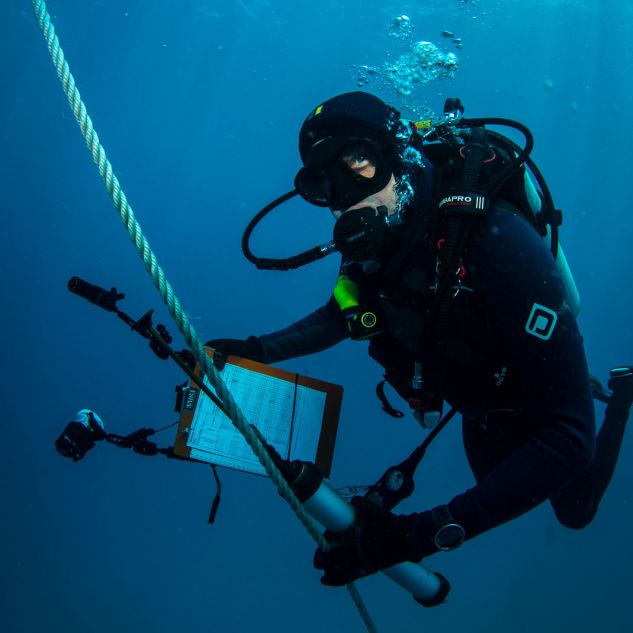
Written By
Mykala Wright
College
College of Science and Engineering
Publish Date
4 June 2021
Related Study Areas
Protecting coral and shellfish reefs
Coral and shellfish reefs are among the most biodiverse ecosystems on Earth. Covering less than 1 percent of the ocean, they are home to more than a quarter of all marine life. They also support half a billion people on land, providing food, income, and coastal protection. But like many other habitats across the globe, their survival is at risk.
JCU researcher Dr Ian McLeod is exploring ways to bring life back to these essential ecosystems. “This time is our chance to turn the tide. We have put in decades of effort degrading and destroying natural habitats and at a real cost to humanity,” Ian says.
Although marine habitats are naturally resilient, when local pressures like overfishing and poor water quality combine with global threats like warming waters, the chances for coral and shellfish reef self-recovery are compromised. Ian’s research takes a more hands-on approach.
“This decade is a global movement to start thinking about rather than just destroying, can we bring some of this stuff back and be better stewards of the environment,” he says.
#GenerationRestoration
In the past, managing marine ecosystems has largely focused on passive strategies that aim to lessen or eliminate threats, like reducing land-based sources of pollution or introducing marine protected areas. But there is a growing realisation that these strategies alone may no longer be enough to improve coral reef habitats or recover biodiversity.
“It would be awesome if all we had to do to restore our natural environments was stop damaging them and they’ll magically come back. And in some cases, it happens, but in a lot of cases you have to get your hands dirty,” Ian says. “If you look at forests, for example, they won’t come back on their own so we replant trees, or we repair the soil. We do something first.”
Although ecosystem restoration is well-established on land, it is still being explored as a strategy for improving degraded marine environments. Ian’s research looks at a number of different tools that aim to speed up reef recovery, including coral gardening, manually removing macroalgae, larvae propagation, and even ways to potentially cool the reef during periods of mass bleaching. His work spans ecological, social, and economic research and is increasingly focused on management and policy.
“Restoration is pretty new in the ocean, and it’s harder to work in the ocean. You can’t look into it from the surface, and we can’t breathe underwater without scuba tanks,” Ian says.
“A lot of the work is around ecological and mathematical modelling, so using the best information and climate scenarios to predict outcomes from a computer. But everything needs to be trialed as well, so you’ve got to go out into the reef and see if things actually work like you’ve planned.”


Recovering ecosystems is complicated
Ian emphasises that reef restoration should not be seen as a quick fix to guarantee reef resilience, but more as a tool to be used alongside other strategies aimed at reducing external stressors.
“While restoration provides us an opportunity to bring back some of these really important habitats, it is also a reminder that the best way to restore things is to not destroy them in the first place. It’s important to protect what’s left because it’s very expensive and difficult to restore ecosystems,” he says.
Although promising, recovering ecosystems is a complicated approach. In some cases, reviving a depleted resource is not possible, and even when it is unfavourable outcomes may occur.
“You might do an awesome wetland restoration project but then you accidentally provide a really great habitat for mosquitos. That’s why research is so important, because we are still working it out in the marine environment. There’s a lot to consider and it takes all sorts of different disciplines working together to figure it out,” Ian says.
For Ian, the challenge of reef restoration inspires passion.
“What a great thing to do with your life, to try and repair this beautiful world under the sea and bring it back so we’ve got something for future generations.”
Dr Ian McLeod
Ian has completed extensive work on reefs, with his shellfish restoration research winning the 2020 Eureka Prize for Applied Environmental Research. He is the Assistant Director of TropWATER and Assistant Program Director for the Reef Restoration and Adaptation Program.

Featured researcher
Dr Ian McLeod
Principal Research Fellow
Dr Ian McLeod is a Principal Research Fellow and the Assistant Director for TropWATER at JCU. His research centres on coastal habitats, ecotourism, ecology, climate change, and coastal waters. He leads a number of collaborative projects that investigate Australia’s shellfish and coral reefs.
Since 2019 Ian has served as Co-Chair for the International Coral Reef Initiative ad hoc committee on reef restoration. In 2020, he was seconded full time to the Australian Institute of Marine Science to help lead the Reef Restoration and Adaptation Program. His team received the 2020 Eureka Prize for Applied Environmental Research, and he received an ABC Top 5 Science award. Ian collaborates with government, industry, cultural and non-government organisations to focus on management and policy.